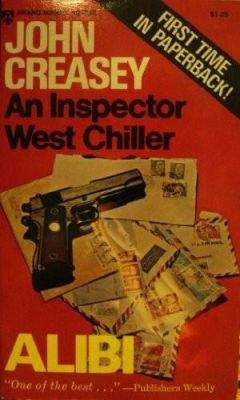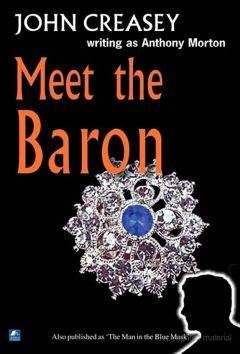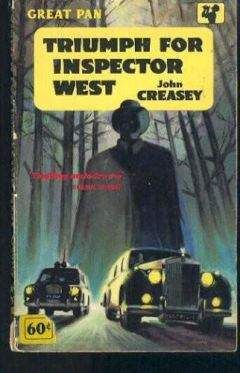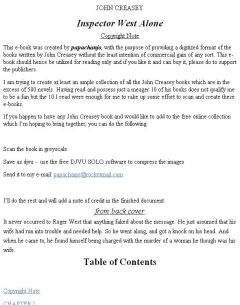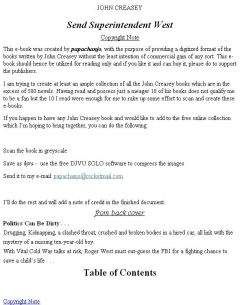John Creasey - Inspector West At Home
На сайте mybooks.club вы можете бесплатно читать книги онлайн без регистрации, включая John Creasey - Inspector West At Home. Жанр: Прочее издательство неизвестно,. Доступна полная версия книги с кратким содержанием для предварительного ознакомления, аннотацией (предисловием), рецензиями от других читателей и их экспертным мнением.
Кроме того, на сайте mybooks.club вы найдете множество новинок, которые стоит прочитать.
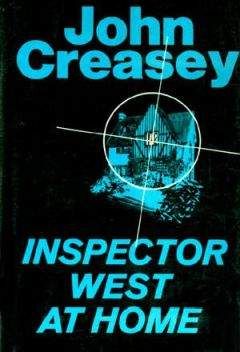
John Creasey - Inspector West At Home краткое содержание
Inspector West At Home читать онлайн бесплатно
“Nothing,” Roger said, quietly.
She stared at him. “Nothing ? You have the nerve to stand there and say “nothing”! I could have told you what was happening, gone to the police-station and made them understand it, I shouldn’t have cared what happened to me. Sometimes I thought that it would be a relief to get it all over and to come out of prison after serving my sentence knowing that there was nothing hanging over my head. But — there was Bill. And I couldn’t screw myself up to it, I just went on and on, until that day when you came in.”
She fumbled with her handbag and to Roger’s surprise she took out a cigarette-case. Her fingers were trembling. He saw several little tablets in the case — or rather — their reflection in the mirror; Janet could not see them.
Roger snapped : “Don’t be a fool!”
She swung away, making Janet stumble, and put her hand to her lips, but Roger knocked it away. The tablets flew across the room and struck against the far wail. Lois stood staring at him, wide-eyed.
“I — I don’t want to live !” she gasped.
Roger was looking into her face when the door burst open and Tennant strode in.
“What are you doing to her?” he demanded in a harsh voice. “You told me you wouldn’t do anything.”
Roger said, without looking over his shoulder :
“She has tried to kill herself, because she doesn’t think you’ll be interested in her when you know that she has mixed with thieves and rogues.”
“I don’t care what she’s done!” Tennant snapped.
“Do you mean that?” demanded Roger.
“Of course I mean it,” said Tennant, fiercely.
Janet caught Roger’s eye. He squeezed Lois’s shoulders and spoke without smiling.
“If the worst comes to the worst you might be sent to prison for six months. By telling everything you know, you’ll almost certainly be given a suspended sentence, and you’ll have paid for what you’ve done by giving information about the others. And you haven’t been so very wicked, you know.”
Then he turned and left her. Janet was already at the door and Mark in the other room. Janet closed the door firmly as Tennant asked :
“Lois darling, what is it all about?”
“That’s exactly what I want to know,” said Mark, eagerly. “What is it all about, old man ?”
Roger told him, glad of the opportunity of going over it again. He could see how carefully it had been built up, how the weight of Lois’s conscience had worsened her plight in every way and encouraged her to play into Malone’s hands. He had deliberately made comparatively light of it, believing that she had suffered enough already. He did not think she would hesitate to make a full confession now, but when he finished, Mark put into words one of the thoughts which weighed heaviest on his mind.
“Malone knows what she can do and won’t let her stay free for long without making a big effort to get her.”
“That’s the risk,” admitted Roger.
Janet said : “The best place for her is in a police-station. I won’t be happy until she’s in one.”
“I told Tennant so this afternoon, and I think she’ll be amenable,” Roger said. “When she’s had it all out with him, she’ll be a different girl. I don’t think he’ll let her or us down.” After a pause, he went on : “At least, we’re making some progress. I missed something at New Street, Battersea — I didn’t discover that Benny Cox was one of Malone’s gang, which was bad.”
“Do you think that’s the only reason they tried to frame you ?” Mark sounded incredulous.
“It’s probably one of them,” Roger said. “Friday the 13th. Pickerell sounded annoyed with superstition. I thought, when I first heard that record, that it meant he himself was superstitious, but I’m beginning to wonder if someone else didn’t give him his instructions, someone who was influenced by the 13th. The thing is, if I had seen a connection between Cox and Malone I would have been after Malone very quickly. We’ve always assumed that Cox killed his wife for her money, but supposing she had discovered what he was doing, supposing New Street was used for storing stolen goods and Mrs Cox threatened to tell the police?” Roger frowned. “Cox was a miserable little brute. I can’t imagine him going through the trial and letting himself be hanged, if by squealing on Malone he could perhaps have saved his life.”
“I see what you mean,” said Mark.
“On the other hand, he may have killed her and, knowing that he couldn’t save himself no matter what he did, he just let things go,” Roger said. “He acted dumb all the time. I once thought that the defence might try to prove insanity, Oliphant hinted at it once or twice, but Oliphant’s a good enough lawyer to know whether the plea would have a chance of success. Cox hardly said a word once he was caught, it seemed as if the shock was too much for him. Dull- witted,” he added, “very dull-witted.” His voice rose. “Too dull-witted ?”
“What the deuce are you getting at?” demanded Mark. Roger said, softly : “I’m wondering if Cox was drugged before we caught him, and whether that made him seem so dull?”
CHAPTER 19
Lois’s Whole Story
MARK SAID dubiously that it was a possibility, but wasn’t Roger allowing his imagination to run away with him? Roger went into the other room and took out the Cox-case files. He turned up the medical reports and scanned them. Three doctors had examined the man, one for the police, two for the defence. They were unanimous in saying that Cox had been a person of low mentality, very nearly subnormal. The police doctor said that there was no doubt at all that he knew what he was doing and he was fully responsible for his actions. Obviously medical opinion for the defence had not really thought it possible to prove otherwise, and so the defence, in the hands of Oliphant, had not tried to sway the jury on the grounds of insanity.
‘Reflexes, dull,’ Roger read, ‘pulse below normal, pupils enlarged . . .’ ‘A man who had been given one of the depressant drugs might be in that state for months after his last dose.’
“Well?” asked Mark, after nearly half an hour’s silence. “Have you found anything?”
Roger seemed to be thinking of something else.
“Er — no,” he said. “That is — no, it can’t be !”
“How brightly he goes on,” drawled Mark.
“Do be quiet,” said Janet.
Roger thought again of Friday the 13th.
The sordid little house, the floorboards, the nauseating smell, the ‘straightforward’ murder and the dull-witted Cox. He remembered him at the police-station awaiting the second hearing at the police court; he had been remanded for eight days at the first.
“I just can’t credit it!” he exclaimed, standing up and pushing his chair back.
Mark shrugged his shoulders and said in sepulchral tones :
The great policeman is slowly going insane.”
Janet said :
“Can we help, Roger?”
“No,” said Roger. “No. That is — I was at New Street collecting all the paraphernalia of evidence. The camerawork was done, and the fingerprints. I’d found the hammer which Cox used. There were bloodstains on the wood. He hadn’t cleaned it properly, and it certainly caused the wounds in his wife’s head. In short, all the evidence was there. I was going off, feeling fully satisfied although it was a nasty case—”
He paused.
Mark no longer acted the fool, but eyed him intently. The voices came from the other room in a steady ripple.
“A taxi drew up outside,” Roger said. “Oliphant came out. Oliphant,” he repeated, softly. “He said that he had been asked to act for Benny Cox.” He leaned back in his chair with his eyes closed. He saw the portly solicitor, Mortimer Oliphant, a well-known lawyer who frequently acted for poorer criminals. He was ambitious and took on difficult jobs which a less forceful solicitor would have refused. He worked for the Poor Person’s Legal Society and was one of its brighter members.
Mortimer Oliphant had a man at the court regularly, and if a case appeared particularly tricky, or whenever there seemed to be the slightest chance of pulling off an odds- against case, he would volunteer to take it. He briefed young barristers who usually did well. His reputation was excellent and he often managed to win a case which the police thought was a foregone conclusion. A man of middle-age, he had a large private income. He always claimed that he specialised in criminal cases because he liked the excitement of matching his wits against the police.
Roger remembered the smile on Oliphant’s face when he had squeezed along the narrow passage and seen Roger in Cox’s kitchen. He had pulled a wry face and said that he hoped it wasn’t necessary to stay in that atmosphere for long. Roger had not thought twice about his appearance, for he had guessed why he had come.
“I’m going to look after Benny Cox,” Oliphant had said.
Roger remembered smiling. “You’ve backed a loser this time!”
“Oh, I don’t know,” Oliphant had said. “I always enjoy a few rounds with you. You don’t mind if I look round?”
Roger remembered admiring his thoroughness. Few solicitors would have taken the trouble to come to the scene of the crime. He had thought nothing of it even when he had read through his report for the day — “Oliphant saw me at New Street and said that he was going to handle Cox’s defence.” He had not troubled to go over it again. It was the kind of thing that Oliphant did. True, he came to the Yard more often and asked for information. Being a likeable man one somehow always gave him what he wanted. Roger vaguely remembered another thing; that Oliphant had been called to the telephone one day at the Yard.
“You shouldn’t call me here,” he had rebuked the caller. “What is it you want, Mai—?”
That ‘Mai’ could have been short for Malone.
“Oliphant,” said Mark, quietly. “Didn’t you say that he handled Cox’s defence?”
Janet answered for Roger. “Yes.”
“You think—” Mark began, but his voice trailed off.
“I can’t think of anything else which might have made Malone and his leaders fear that I might have seen what was happening,” Roger said. “Oliphant doesn’t often visit the scene of the crime — he usually gets to the case when it’s too late — but he was very quick this time. Supposing he was briefed by Malone or whoever Malone is working for? Supposing he realised afterwards that his eagerness might have been suspect ? He would tell his client, of course. The client is superstitious. It happened on the 13th — “one of these days West is bound to see something funny in it, we’ll have to make sure that he can’t do any harm”. It would answer everything,” Roger said.
“Would Oliphant let anyone go for you, Roger?” Mark asked. He knew the solicitor well and found the suspicions hard to believe.
“He might,” said Roger. “He might even have thought that I was keeping something up my sleeve. I was feeling in a good mood that morning and made one or two cracks, the kind that come out when everything has gone well. Oliphant might have misread my attitude. He might have discussed it with his client. The framing was clever. Not too obvious, just enough to make sure that Chatworth would have to take notice of it. Whoever planned it knew Leech’s reputation with us. Malone might have known everything else, but he couldn’t have known that we relied so much on Leech. Oliphant would. I wonder—” he stood up slowly — “I wonder who the legal adviser to the Society of European Relief is? We’d better phone the Yard and find out.”
“I’ll do it,” said Mark, promptly.
Oliphant loomed so much in Roger’s mind that he did not notice the louder note of Tennant’s voice in the next room.
The door opened and Tennant strode out, holding Lois by the hand — and Lois seemed much more at peace.
“It’s all right!” declared Tennant.
“What’s all right?”
“I’ve fixed it — I mean, we’ve fixed it,” said Tennant. “She’s told me everything. There’s no need for you to question her again, I’ve got it all written down. You want the names of the people she went to see, don’t you?”
“I certainly do,” said Roger.
“I knew you would,” said Tennant. “She’s remembered a dozen — they’re all on the list, together with the gist of what she told you.” He put a small notebook in front of Roger and beamed widely. “All written in ink and Lois has signed it. But,” he added with a quick frown, “you’ve got to keep your side of the bargain. I don’t know much about the law but I do know there’s such a thing as Queen’s Evidence. If this isn’t Queen’s Evidence, I don’t know what is!”
Roger smiled. “Yes, you’re right.” He looked at Lois reassuringly. “It will all work out well. We’re far more interested in finding these people and stopping their crimes.”
Lois looked more rested.
Before he looked at the list, Roger said :
“There’s just one thing. While Malone is free—”
“I’ve talked to her about that,” Tennant said; “this afternoon you said the safest place for her would be a police- cell, didn’t you? Malone can’t get into one of those! Well, Lois agrees!”
Lois nodded.
“You couldn’t have made a wiser decision,” said Roger.
He did not know how Tennant had made the girl feel that it was safe to trust the police. She did not protest, nor did she try to stipulate any conditions.
Before going to Mark, who was still on the phone to the Yard, and taking over from him, he ran his eye down the list of names and addresses which Lois had dictated to Tennant, thinking that it would probably be enough to break the case wide open. The last entry but one made him start and look up eagerly into her eyes.
“Oliphant — Mortimer Oliphant, at Cheyne Walk, Chelsea?”
“Yes,” said Lois, quietly.
“Did you ever go there with stolen jewels?”
“No — only with messages about men whom Pickerell knew. He was the Society’s legal adviser, but these weren’t Society problems. Pickerell always saw him alone.” She hesitated. “I rather liked Mr Oliphant. He was always very friendly.”
“Oh, yes, he would be,” Roger said, “he would be very friendly indeed!”
Mark came back like a man with good tidings, but suddenly deflated when he learned that Lois had already given the information.
Roger felt on edge, in spite of the way the case was shaping. He wanted to see Oliphant, to report his discoveries, and to make sure that Lois was absolutely safe. He realised that few bad men had made such an impression on him as Malone. He did not feel sure that the short journey to the Yard could be negotiated safely and he went out, to see Pep Morgan’s men and the two police who were watching the hotel. They assured him that nothing suspicious had happened. He sent one of the police back to the Yard to get a car.
Похожие книги на "Inspector West At Home", John Creasey
John Creasey читать все книги автора по порядку
John Creasey - все книги автора в одном месте читать по порядку полные версии на сайте онлайн библиотеки mybooks.club.
